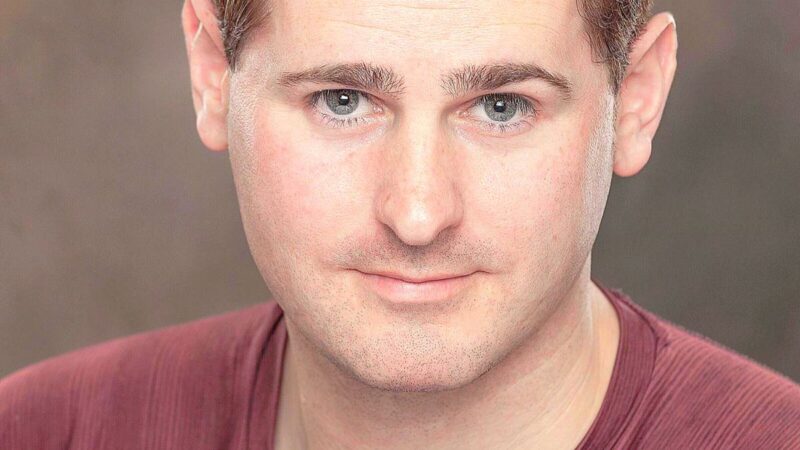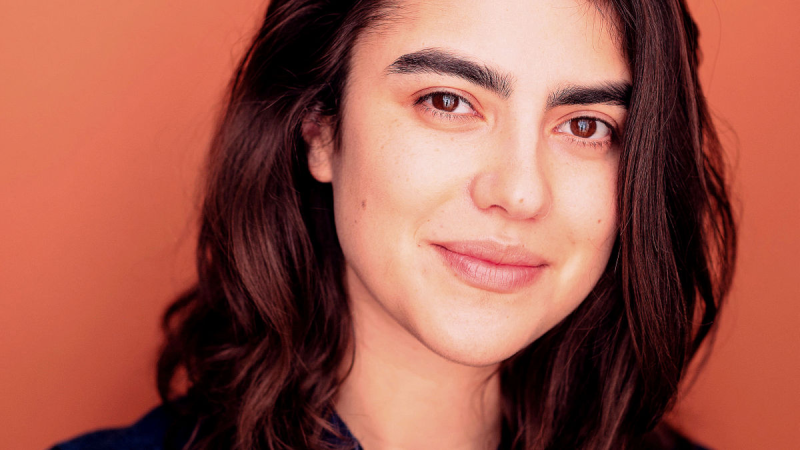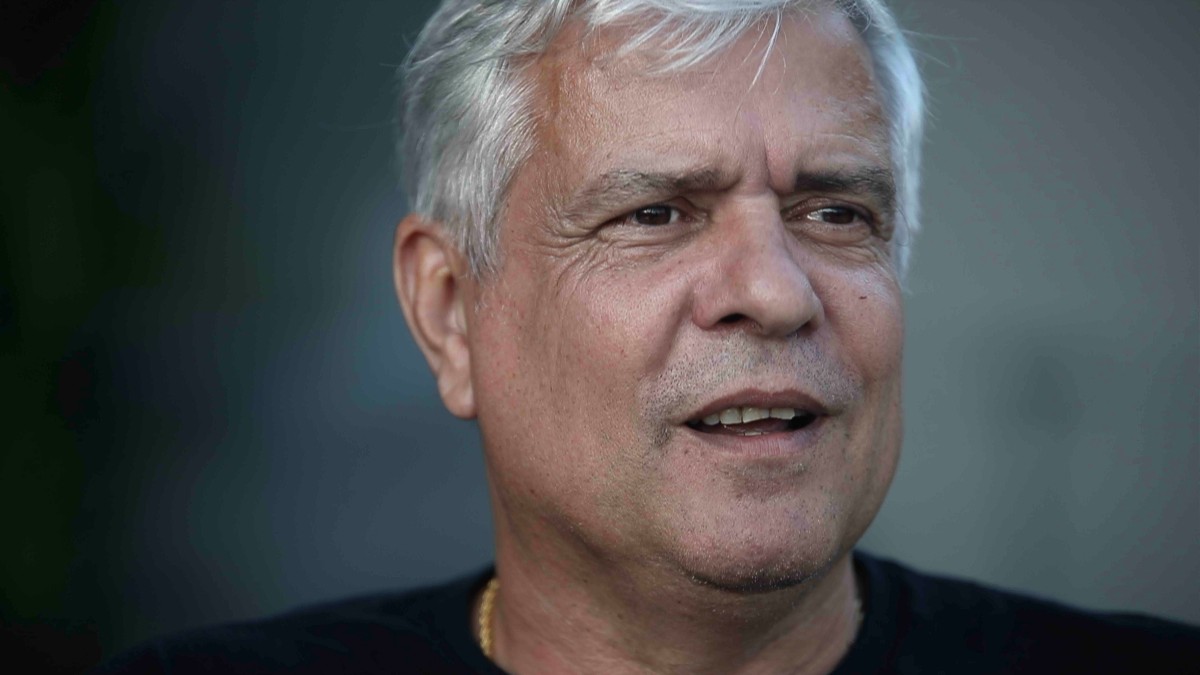
A Case Study
Narrative | Dramatic Features
Film Name: HIV Saved My Life
Genre: Documentary
Date: January 2020
Director: Paul Edward Foulkes
Producer: Paul Edward Foulkes
Writer: Paul Edward Foulkes
Cinematographer: Aaron Yamashita
Production Company: E.D.I corporation
Budget: Under 10,000 USD
Financing: Personal funding
Shooting Format: Digital
Screening Format: Digital MOV
World Premiere: Global Nonviolent Film Festival
Awards: 20
– World Film Carnival – Singapore October 5, 2020
– CKF International Film Festival September 30, 2020
– Accolade Global Film Competition August 24, 2020
– Docs Without Borders Film Festival August 23, 2020
– GOLDEN VALLEY GLOBAL CINEFEST May 7, 2020
– New York Movie Awards April 2, 2020
– Tripvill International Film Festival March 29, 2020
– Model N Movie International Short Film Festival January 30, 2021
– Kosice International Monthly Film Festival May 3, 2020
– Canadian Cinematography Awards (CaCA) June 1, 2020
– Aasha international film festival August 31, 2020
– Global Nonviolent Film Festival September 4, 2020
– Wallachia Int’l Film Festival September 7, 2020
– Couch Film Festival March 24, 2020
– After Hour Film Festival May 22, 2020
– Virgin Spring Cinefest February 26, 2020
– Awesome Film Festival September 5, 2020
– Druk International Film Festival February 17, 2020
– 52 Weeks Film Festival July 30, 2020
Website: N/A
“HIV Saved My Life” is available for viewing on GlobalCinema.online starting on April 15th, 2021.
indieactivity: Tell us about “who you are”?
Paul Edward Foulkes (PEF): I am an English Filmmaker, Composer, and Entrepreneur. I have been involved in Filmmaking for approximately 5 years now, and have directed and produced 5 movies both “Shorts” and Documentary. After retiring from corporate business in 2017 I have made movies making my hobby and passion. I am a strong believer, that everyone has a story to tell. I like to focus on social issues which affect our everyday lives and environment. “The untold stories” giving a voice to those who are normally less willing to “come out and talk about their lives in public.
The Official Trailer for HIV Saved My Life directed by Paul Edward Foulkes
Introduce your Film?
Paul Edward Foulkes (PEF): “HIV Saved My Life” Is a true story about a man who has lived with a condition for the last 20 years. A condition which 20 or 30 years ago spread panic around the globe. A condition that has been and still is looked upon in some areas of society as a gay disease. Many years ago those who were diagnosed with this condition thought that it was a death sentence, a condition which would eventually develop into AIDS and death.
Those who were diagnosed with the disease were looked upon by society as dirty, gay, and more so then, but still today these people were and are discriminated against. This movie is about a man who has lived the journey for the past 20 years with HIV. Discrimination, persecution, depression, suicide, and yet finally was able to reach within himself and find the strength to rehabilitate himself both physically and mentally to become successful in life, and to be able to voice openly in public without fear about his journey.
Tell us why you chose to write and produce this movie?
Paul Edward Foulkes (PEF): In 2015 I met a young Japanese woman, (My Wife Akiko Foulkes) a peace-loving, non discriminate, and open-minded woman, who for the best part of 5 yrs or so has accepted who I am and my condition openly. She believed that my story should be publicized for two reasons;
To allow me to relieve myself of a heavy burden of secrecy which I had carried for many years about this condition. A secret which I had tried to but unsuccessfully hide from the public in order to protect myself and my siblings from the discrimination from society that I knew existed here in Japan.
By talking about my condition and how it had affected my life and those around me, we hoped that others around the world who are suffering from the same or other diseases, for example, AIDS, and other somewhat contagious and fatal conditions which are discriminated against would be able to watch, reflect, and hopefully find strength in that, we are all human. We all travel a path called “Life” and that is so precious.
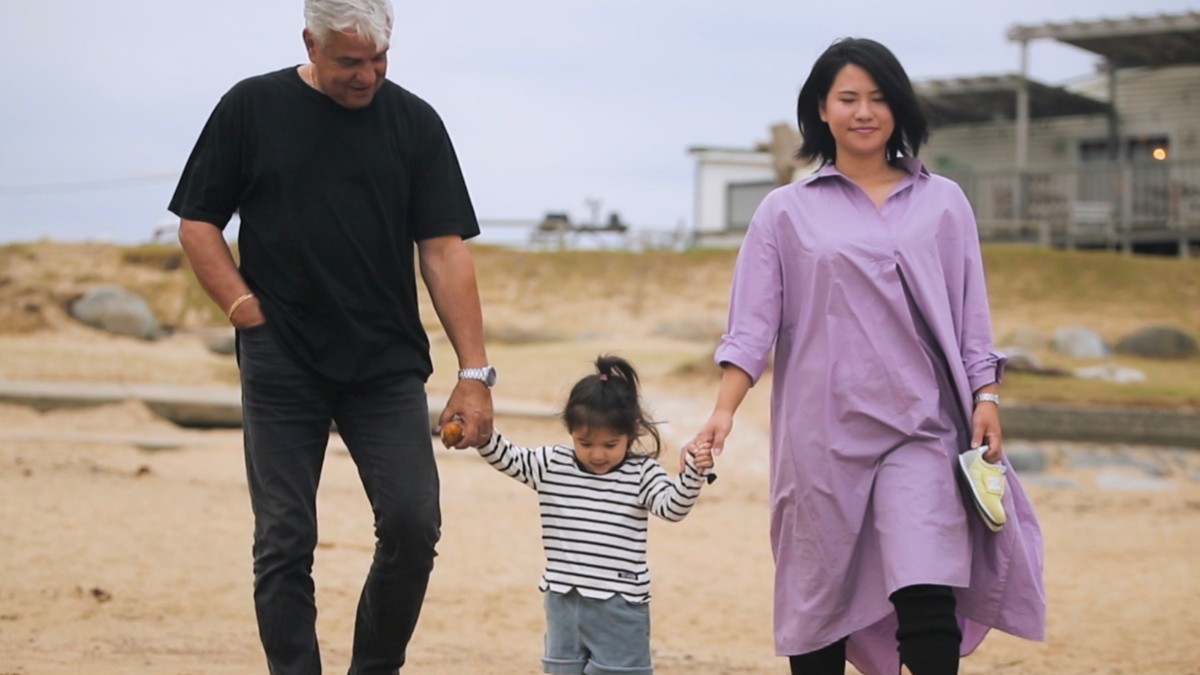
Introduce your crew?
Paul Edward Foulkes (PEF): My immediate crew consisted of Two others although I will mention three. Aaron Yamashita is a young budding Cinematographer, and Editor from Tokyo Japan, who has grown up in this industry for many years, filming all over the world for hundreds of movie projects. A bilingual (English/Japanese) cameraman. The second of course is my wife Akiko, who basically was on standby throughout the entire shoot to make travel arrangements, catering, and pretty much anything needed behind the scenes while shooting the documentary.
The third person is Shotaro Kunitomo who composed all the soundtracks and background music for this documentary feature, a well-known musician and composer who has worked on several projects with me over the years. A Jazz and Classical Pianist who has worked with some of the biggest names in the music industry here in Japan.
What are your personal experiences putting on all these hats/responsibilities (simultaneously)? Tell us about story, writing, and production? Focus only on your feelings, encounters, and learning?
Paul Edward Foulkes (PEF): It was probably the scariest, and yet most personally satisfying experience I have had in life. Not only to sit in front of a camera lens and reveal to the world a dark truth about myself but then to actually direct and edit my own story was a very nerve-racking experience. How does one direct and produce oneself?. Presenting a story like this to the public can be very self intimidating, how do I look, did I express myself clearly enough, will this have negative reactions from those who see it.
The hardest and yet most satisfying experience was that, while making the documentary I had contacted those who had been a part of this journey, women who had been a part of my life in a sexual partnership and had since moved on in life and either gotten married or were in partnerships. The words “Guilty by association” once publicized, anyone watching this documentary could by mistake, assume that those women would also be contaminated, which they are not. Everyone who I had contacted about the making of the documentary replied in the same way. ” you are brave, I respect you for doing this and support you always”. I was, and am humbled by them all. I thank them all for being a part of this journey which led me to finally coming out and making this documentary.
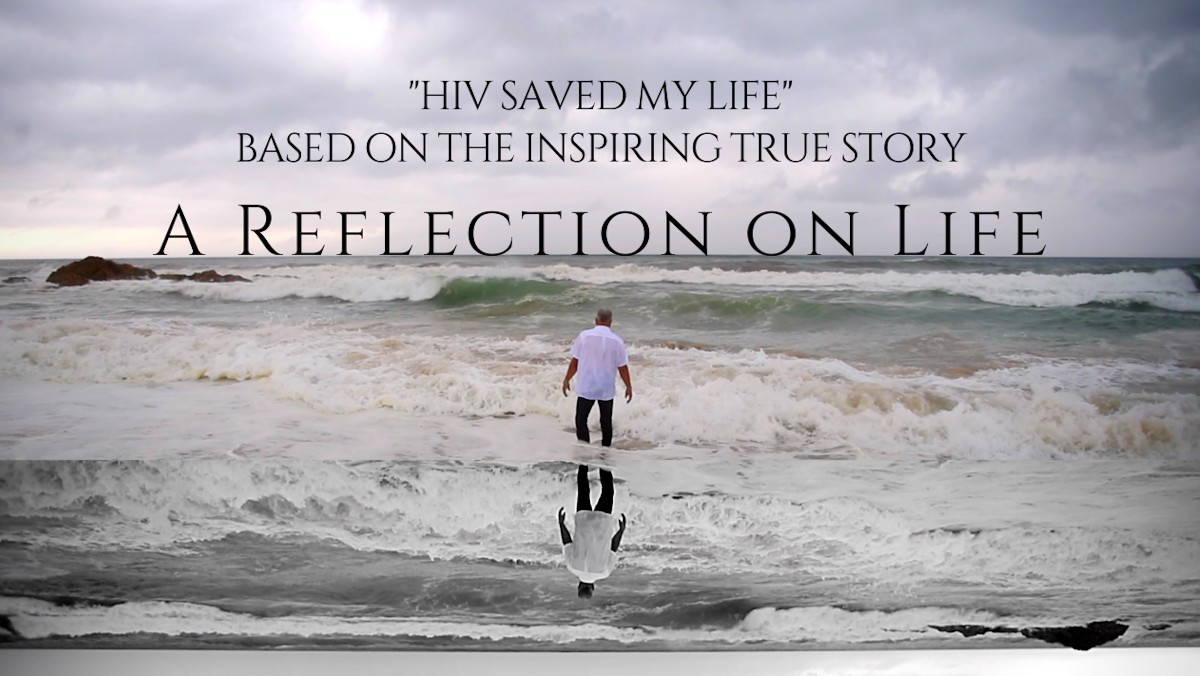
What is the source of the idea? How did the story develop from the idea, and how did the story evolve into a screenplay? Why do this story? Do you have a writing process?
PEF: Spontaneously. I was sitting outside on the deck staring into the distance drinking a cup of tea. My wife sat beside me and we began talking about Emma, my then two-year-old daughter. Being of the age 55 at the time we talked about how amazing it was to have her in our lives, and how thankful we both were that she had been conceived naturally and without risk. I informed my wife that I wanted to my memoirs so that if someday in the future I were to pass away Emma would be able to read the Memoirs and understand who her father was. After a long discussion with my wife, we both decided together that coming out into the open about my condition would be a great way to archive not in words but in film an important part of my life.
After further discussion, we then decide that it would be helpful to others also who have suffered the same experience. Being an outpatient at one of the local University hospitals here in Japan, I had on occasion been asked to give seminars to the Doctors, Nurses, and helpers at the hospital who were involved in treating patients like myself. It occurred to us that not only the medical side, but the public would be interested in hearing this story, and hopefully find strength in themselves to be able to be open with their stories also. This could be helpful not only to myself but to others in need of information. Done! Akiko and I decided that it was time to do this.
Let’s talk pre-production: take us through a timeline of how you started and ended it?
PEF: I immediately focused on writing this part of my memoirs. For weeks I wrote, edited, revised and re-wrote. I contacted my Hospital doctor and requested and appointment. We talked for an hour about what I was proposing to do. The Hospital released all of my medical files to me so that I could research and try to parallel events and emotions which had occurred in my life with actual medical data. I found myself writing the story as if it was actually happening real-time, I was feeling the emotions all over again as I wrote the words. My wife read the story and translated into Japanese, she was satisfied. Great dane! Call the cameraman.
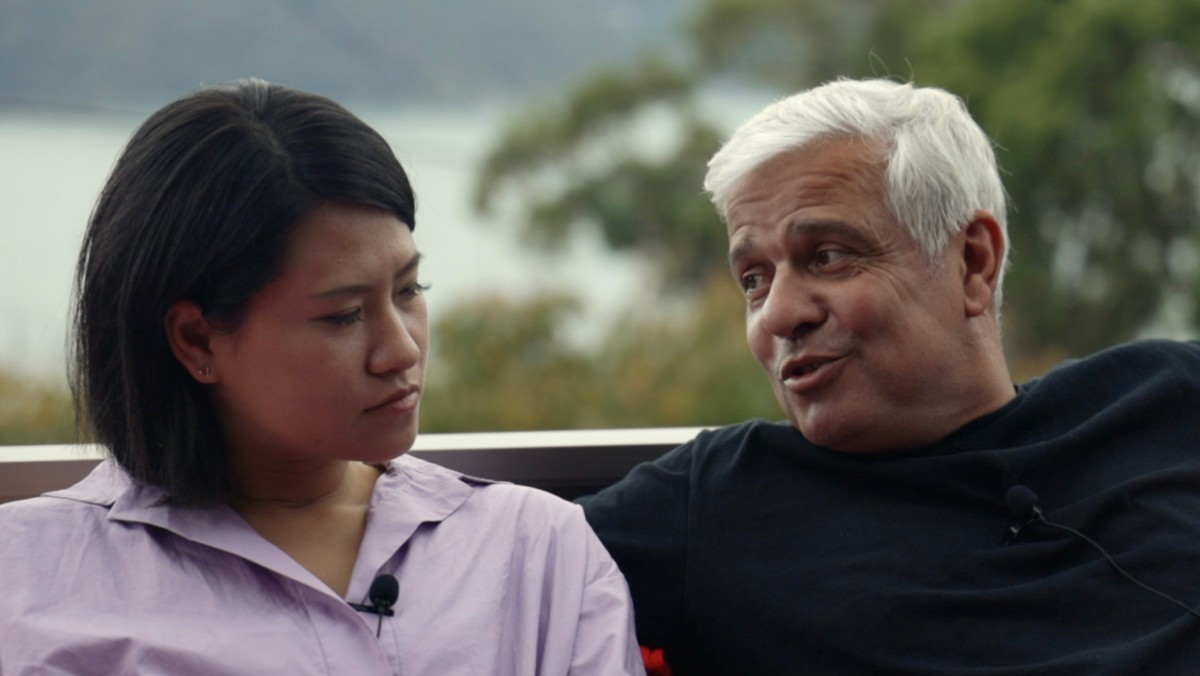
What was your rehearsal process and period?
PEF: Two months of writing and prep. And a lot of emotion!
You shot the film in 4 days. How long were your days?
PEF: From early morning up at 6 am until the sun went down. Unable to sleep, and pumped up with emotions after reliving each take.
Did the tight shooting schedule make it harder or easier? How did it affect performances?
PEF: Tight but relieving. Wanting to tell the story, but not wanting to dwell on it daily for a long period of time worked. The biggest problem was me wanting to continue talking and get it over with but the camera battery packs only last so long. “Gotta change the batteries, take a time out” was frustrating at times.
During the film production, what scene (that made the cut) was the hardest to shoot? And why?
PEF: Each scene was a mental challenge. Giving up personal information about one’s life can be stressful when talking into a camera lens. The scene which I felt was the hardest to shoot was the scene where I talk about suicide. No-one wants to kill themselves, however, when you cannot find a reason to live and your emotional and mental imbalance takes over, you fall into a dark place, secluded and self hating. Reminiscing about this part of my life was stressful and bought back some of those emotions.
What were the advantages and disadvantages in the way you worked?
PEF: Advantages were that we were shooting a documentary about myself, self managed, small crew of two and the location was easy. Disadvantage was that, How do you direct and produce yourself?. Stressful to say the least.
The film looks stunning. How did you get such a good look when shooting so fast?
PEF: Living in a fantastic environment of Itoshima Fukuoka Japan made for a great backdrop, and to be honest the cameraman Aaron Yamashita was great with the drone and esthetics.
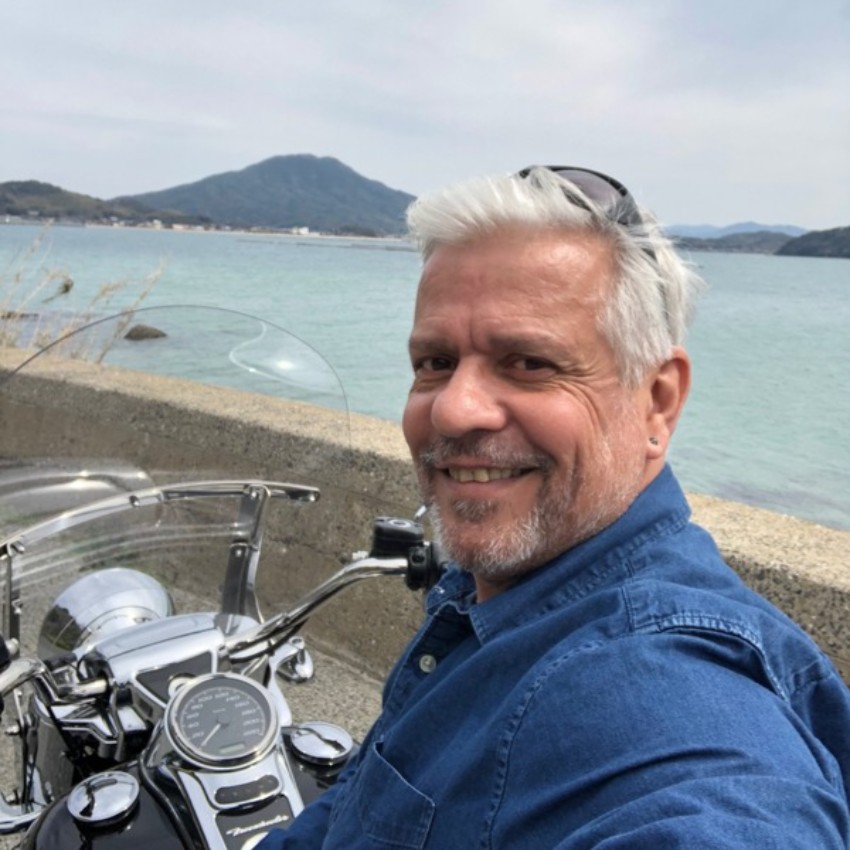
When did you form your production company-and what was the original motivation for its formation?
PEF: In 2015. I had worked in the entertainment industry for 8 yrs prior managing Bands, recording studios and performing myself on the side in small productions. Once I decided to actually go independent then a platform was needed to launch my self financed productions. I love storytelling, so if you have a story let me know. Love this stuff.
What was the first project out of the gate?
PEF: It was a production which I wrote and produced independently in 2015-2016 called “Aimer” Directed by a very well known entertainer in Japan by the name of “Awich”. The short movie was an LGBTQ+ short which won “Best Fantasy LGBTQ+ Short” at the Renaissance Film Festival in Amsterdam in 2017.
What about independent filmmaking and the business do you still struggle with?
PEF: I have only been in the Independent film industry for a few years so it is still hard to tell, however, I do feel that after making a really good award winning film, there are many distributors who approach you with distribution management deals which come with outrageous conditions and in some cases at a high price. “Global NonViolent Film Festival” came to me with a fair deal, and I look forward to sharing the experience with them as they grow. Great communication and an appreciation of the independent filmmaker will make them a strong competitor in the years to come. All the best guys.
Where do your strengths lie in film making?
PEF: Experience in the entertainment industry over the years, in TV, Radio, and Stage production management and production has strengthened my knowledge in the field. Although I am still new to Filmmaking, the passion is there and abundance of technical crews and writers willing to jump into the frying pan with me make life easy.
Let’s talk about finance. How did you finance the film?
PEF: I financed the film myself.
How much did you go over budget? How did you manage it?
PEF: Actually I expected it to cost a little more than we had planned, but good presswork made for an easy shoot without having to do any retakes.
How important is marketing? Talk about the festival tour? Do you think a project can make a dent without it nowadays?
PEF: I think that the Film Festivals worldwide are a great platform to market from. Being recognized or winning an award in itself is a great marketing tool. The competition is vast and it is a competitive market to be in. The festival tour is a fantastic platform to Start from especially for Indies film makers.
Tell us about marketing activities or efforts on this project-and how it worked or didn’t?
PEF: On completion of the Documentary, we posted and entered into over 80 Film Festivals worldwide through the FilmFreeway platform in January of 2020. Corona COVID-9 hit us hard, and our expectations were dampened because many film festivals had to go virtual, however, the festival’s came through and worked hard to put the word out. Other than that I just used a lot of SNS, FB, and other media to try and market to the people I knew. Thanks to them we were able to connect with 3rd parties who were interested in watching the documentary. Thank you all for the support.
What do you hope the audiences will get from the presentation of your film?
PEF: Hopefully the audience will realize that Life is truly a precious thing. Regardless of sickness, pain, and suffering, discrimination, persecution, and a social dysfunctions, we have all been given a truly beautiful gift in the form of “Life” treasure it and the people around you. Do not place a label on genre, religion, or social status, just accept that we are no different from any other, and that we are all Human.
What else have you got in the works?
PEF: I am currently working on three projects, the first is about child sexual abuse in Japan, “This Is My Brave” and the need for government and society, and the legal system to provide a more open undiscriminating platform for victims. This is an interview with a thirty four years old Japanese woman who has lived through this trauma, and tragedy since the age of eight years old, and now at thirty four she is finally angry enough to come out and talk publicly about her ordeals and how she has lived with it over the years.
The second project is about Beauty pageant winners and their behind the scenes stories. “Flirting with Food” A little slapstick open conversation over dinner and wine with Misses World 2017 and Misses Globe 2019. The Director / Chef “Paul” conducts the interview. Wining and dining the two ladies, while he slowly gets them to reveal some of the unknowns about beauty pageants. Both of these projects will be posted on FilmFreeway this spring 2021. The third is a more complex documentary film about the Onsen Culture of Japan. “Onsen” meaning “Hotspring” Story about an American who in his younger days travelled to Japan and lived there for a time.
As a Westerner traveling to the land of the rising sun, with its colorful traditions and deep rooted culture. He experiences the world of Onsen, and eventually he himself becomes what we know as a “Onsen Master” One of only four onsen masters in the world. This project is currently in the initially stages of production and is scheduled to be filmed in the spring of 2022.
Tell us what you think of the Case Study for HIV Saved My Life What do you think of it? Let’s have your comments below and/or on Facebook or Instagram! Or join me on Twitter.
Follow Paul Edward Foulkes on Social Media
Website
Facebook
Twitter
YouTube
MORE STORIES FOR YOU

